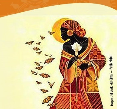Banca de QUALIFICAÇÃO: JOSILÉIA DOS SANTOS DO NASCIMENTO
Uma banca de QUALIFICAÇÃO de MESTRADO foi cadastrada pelo programa.STUDENT : JOSILÉIA DOS SANTOS DO NASCIMENTO
DATE: 04/08/2023
TIME: 14:00
LOCAL: Metapresencial
TITLE:
FEMALE KNOWLEDGE AND QUILOMBOLA EDUCATION: AFFIRMATION AND PRESERVATION OF IDEBTITY AND ANCESTRALITY IN THE TERRITORY OF SAPÊ DO NORTE SÃO CRISTOVÃO/ES
KEY WORDS:
FEMALE KNOWLEDGE AND QUILOMBOLA EDUCATION: AFFIRMATION AND PRESERVATION OF IDEBTITY AND ANCESTRALITY IN THE TERRITORY OF SAPÊ DO NORTE SÃO CRISTOVÃO/ES
PAGES: 115
BIG AREA: Ciências Humanas
AREA: Educação
SUMMARY:
The quilombos emerge as a marked place of struggle and resistance of the black people for freedom against the slave system, a place of reproduction of knowledge and affirmation of identity. Its origin crosses the Brazilian borders, having different denominations, but with the same meaning of organization for freedom against the oppressive system. This territory of resistance and black permanence in Sapê do Norte established itself as a precursor to transmitting the ancestral teachings of Africans and Afro-Brazilians, in social, political and environmental actions. We emphasize the importance of this space in the aforementioned study, which consists of reflecting on black cultures in the region of São Mateus. The objective of working on Afro-Brazilian culture within the territory of Sapê do Norte in quilombola schools, contributing to its strengthening, bringing students closer to the sociocultural context through the practice of cuisine present in this region supported by black people, a practice that resists and persists to the present day in these territories. Cooking allows us to walk through the symbolic dimension and build survival alternatives. Being beyond the gustatory act and killing hunger, constitute as ancestry, identity and cultural movement. The study covered paths of possibilities for dialogue betweenthe community and the authors we will work with: Gomes (2015), Moura (1959), Ferreira (2009), Almeida (2002), Oliveira (2005), Serafim (2020), Maciel (1994 ), Santos (2011), Macedo (2014), Borges, 2020. Among other theorists who study the quilombola culture. The methodology we are using in the research is bibliographical, documental, action research with intervention through workshops.
COMMITTEE MEMBERS:
Presidente - 1149021 - ANA CRISTINA SANTOS PEIXOTO
Interna - 1218431 - ELIANA POVOAS PEREIRA ESTRELA BRITO
Interno - 1085938 - FRANCISCO DE ASSIS NASCIMENTO JUNIOR
Externa à Instituição - SIMONE RAQUEL BATISTA FERREIRA - UFES



